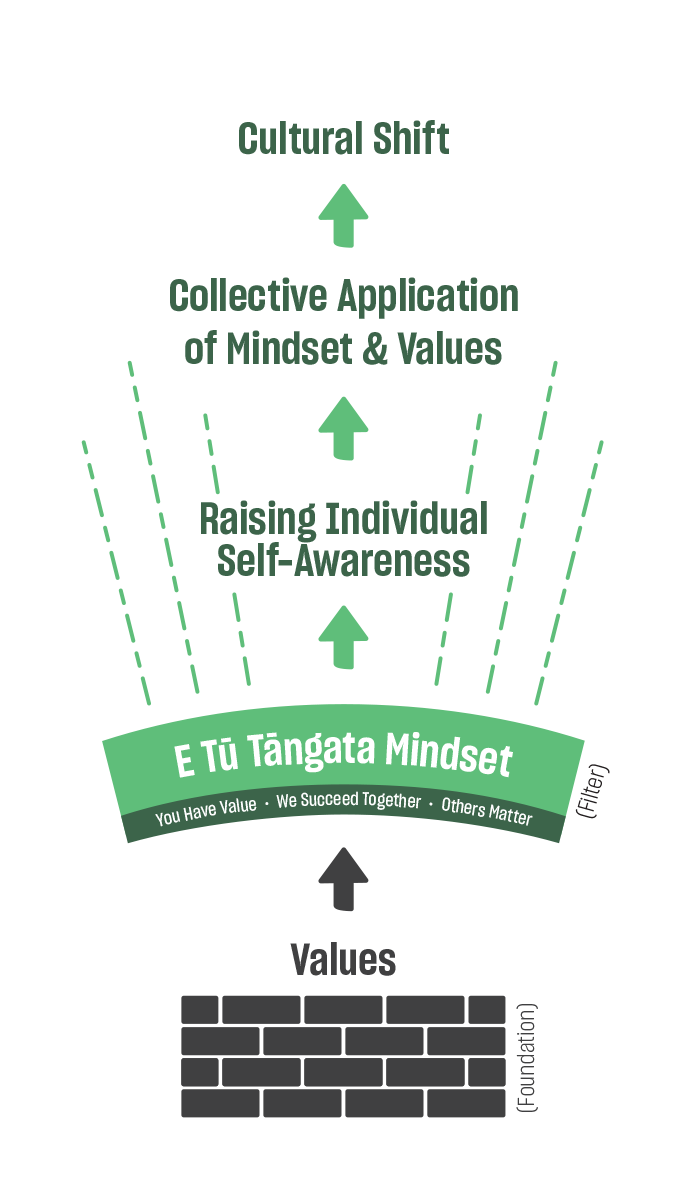
Change our culture
E TŪ TĀngata & Tall Poppy Syndrome
Deep Culture
Edward T. Hall was an anthropologist who suggested that culture was similar to an iceberg. He proposed that culture has two components and that only about 10% of culture (surface culture) is easily visible; the majority, or 90%, of culture (deep culture) is hidden below the surface.
While many of Hall’s peers were studying the obvious outworkings of culture: music, dance, language, food, clothing, etc., Hall was fascinated with intangibles. He argued that some of the most important aspects of culture were those things that were invisible (the things that lay below a person’s conscious awareness) like the unseen mass of an iceberg below water.
It is now widely accepted that a person’s culture often manifests and flies below the radar of human awareness. Tall Poppy Syndrome (TPS) is an example of a cultural worldview held by most New Zealanders. It is a part of our deep culture, is implicitly learned and communicated, and is accepted (and often excused) because ‘that’s just the way we are.’
A Tall Poppy is defined as: A person (or institution) who is successful and therefore attracts envy.
Tall Poppy Syndrome (TPS): noun, a ‘mediocre-maintaining mechanism’ by which a person (a tall poppy) who has achieved success is criticised or discredited by others in order to ensure that they (the tall poppy) does not excel beyond the reach of those around them.
Typical manifestations of TPS: (from dictionary.com)
A tendency to begrudge, resent or mock people of great success, talent or status
A tendency to downplay one’s own achievements or talents in order to avoid the resentment and mockery of others.
And while deep culture is hard to change, it is not impossible. This is because all cultures are contingent – they invariably change and therefore, can be changed. A key way to do this is through the use of language. Language reveals what lies beneath the surface, it makes the implicit, explicit and unconscious behaviours become conscious.
E Tū Tāngata is therefore a cultural conversation about a central worldview (TPS) that lies beneath the surface of our interactions and relationships here in Aotearoa. We aim to shift this mindset by promoting a culture where everyone is valued and success is celebrated collectively. We do this through actively articulating three strands: 1) You Have Value; 2) We Succeed Together; and 3) Others Matter.
When we asked educators to identify a key villain faced by New Zealand schools, we received this response: “The thing that has already been modelled by society - that negative comment that isn’t viewed as a negative comment.”
Cameron Winsloe | Rolleston College Associate PrincipaL
CREATING A CULTURE SHIFT
Every school, business, family and organisation have values or core beliefs that are foundational to how that group or community function.
E Tū Tāngata has been developed to support and plug into your current values, strengthening what is already established and creating a culture shift that starts with individual awareness and then flows on to the wider group.
E Tū Tāngata is an initiative developed to inspire conversations in your whānau, schools & workplaces focusing on three core strands:
To take the first step towards transformation
A person must understand and believe that you have value (ME). This flows on to understanding the worth of others and identifying how, collectively, a classroom, workplace or community can succeed together (WE).
Finally, an individual understands what it means to be a part of something bigger than themselves. This involves looking outside of their classroom, workplace or community and recognising that others matter (OTHERS). This inspires the question: how can we E Tū Tāngata throughout the wider community?
Dr Myron Friesen | Senior Lecturer | Canterbury University







